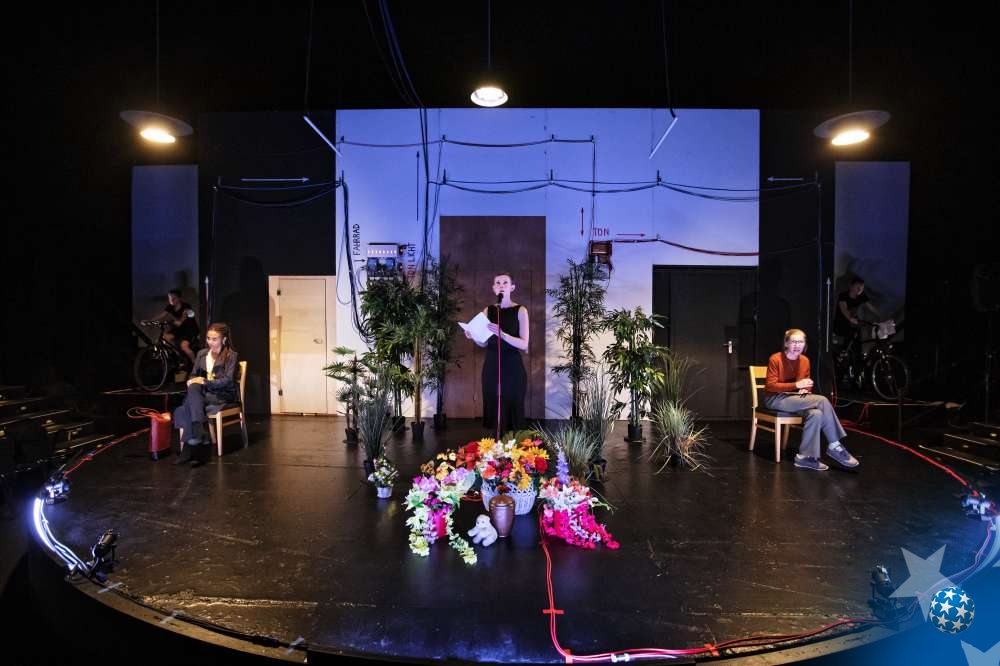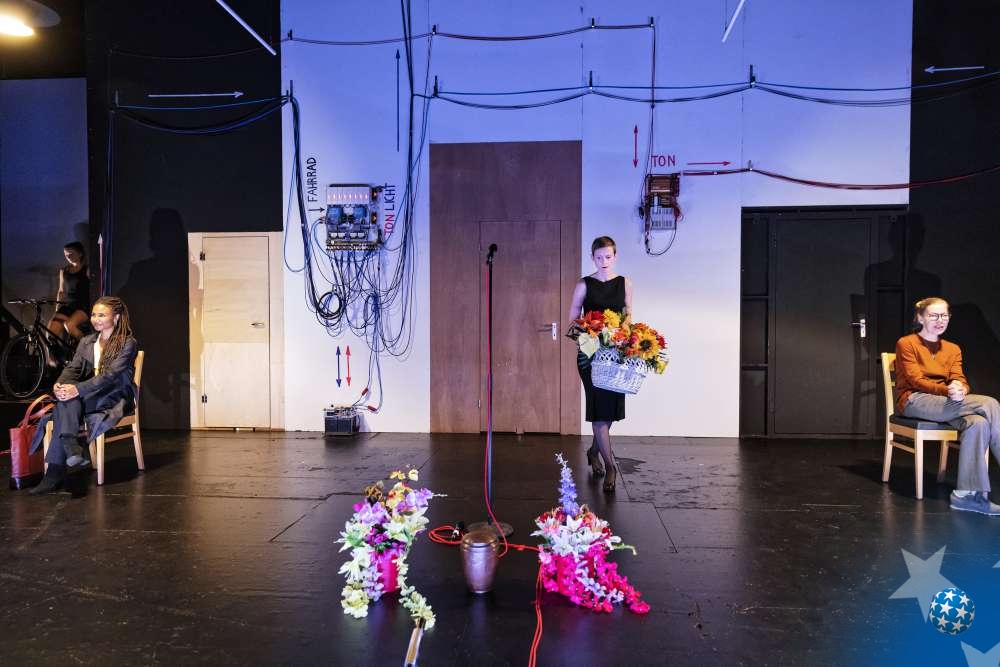- Firstly, I would like to ask you about the Katie Mitchell performance. You have translated the text for the play (Not) the End of the World by Chris Bush. What is your responsibility when translating somebody else’s text? Was it just a translation or did you have some authority over the text?
I think it is half-half. When you translate, you have a very high responsibility towards the original writer in the sense that you have to understand what they are doing not only regarding the plot and the context, but also with the atmosphere and the language, the type of writing. And then, of course, there is that question: what does the translation mean? Of course, you can translate it one-on-one but that does not convey the original meaning or the original atmosphere. Many times, I would come as a writer and try to find a German version of the British voice. In this special production, it was very nice that I was able to read the text from the first draft and get together with Chris Bush and Katie Mitchell before I started translating. So, I was able to grasp the ideas very early on, which was very helpful.
- This play is mostly about the ecological crises, but besides that, it also refers to the issue of the power structure in the modern academic world. Since you are a university professor, what is your opinion on that?
I think it is a very interesting play because it is not just about the climate crisis, which is more than a crisis, but it also addresses the issues of patriarchy and racism, and colonialism. It is related to so many things and you need to think about it on many levels. And when it comes to me, I do have this position of power. I am in the hierarchy at the university. Of course, there are a lot of professors that are older than me or are male, but still, I am in a position of power, so it is my duty when I work to bear that in mind. It is my responsibility to work with other writers that teach who represent different values and come from different backgrounds. I have the responsibility because of my position of power. Sometimes you need to let other people speak and sometimes you need to step down completely to let somebody else take this position. I think it is important because power is abused all the time. And even though I think about all these things, I still play a part in the hierarchy. It is always important to reflect and sometimes to step down.
- We have already mentioned that this play refers to the issue of the ecological crises, but it is specific because it does not just problematize this topic, but is also eco-friendly. During the play, all electrical power comes from two persons riding bikes. How important is it for the theatre to be ecologically responsible? Not just in sense of topics it deals with, but in the production as well? Especially when we have these electrical crises on us.
I think it is really important. Otherwise, you would be doing a play about climate change while contributing to it in a negative way. It is like doing a play about classes with only white actors and actresses. You always need to reflect the same structure. What I like about this production is that you have two people on bikes who are responsible for the sound and lighting for all the shows and the general rehearsals. During the rehearsals, not the whole team was present live. As I remember Katie Mitchell and a part of her team were present by Zoom for a long time so they could keep flights to a minimum. It is necessary for theatres to think, like everybody else, about more climate-friendly solutions for production. The theatre in some way is supposed to be political or working on change. If it does not do that, it does not have a purpose anymore.
- The corona pandemic brought this division between necessary and unnecessary jobs, with culture being among the latter. How do you think that theatre and the people working in it are going to survive?
Honestly, I do not know. It would be nice if I had a solution. It is important to be aware of that corona crisis, not just to start over as if nothing happened. It is important to know what you value about this job, which you now know even better because you went through these crises and these institutions were closed. Just keep reflecting on all this and keep going and working, but not always trying to reflect on what we went through. I think that doing things in the same way is not possible. But that’s also a good thing, because if you do things always in the same way, it’s a way to disaster.
- You have also worked on the project “New Stage South-East” by Goethe-Institute. You were a mentor in these workshops for young people and future authors. In your opinion, what is the most important thing from this workshop for their future as authors in this time of crisis?
I think that what is important about being in this workshop is that you get to know other writers from different backgrounds and different countries. They bring with them different stories, and you get to know how they think and what tools they use, so you can exchange and have a network. It is a companionship among those writers. This is the most important about this project. It is what you can take with you for the future to be successful in the way that you feel about yourself being a writer.
- These texts were written for a youth theatre. Why is it important to have a theatre for young audiences?
It is important to give them perspective and show them what art can achieve. These are the people who have not fucked up things. They have the power and the ability to change things and to do something differently, so it is really important not to underestimate them. I think that culture is a very big part of education, so it is important to develop theatre for young audiences.
- How should we bring more young audiences to the theatre?
Maybe not to think of theatre as something elitist, but something for everybody. You do not need to have a wealthy family or a certain education or whatever. And maybe also for us writers, the people who make the theatre should think more about the narrative and the way they tell the story. The pace we tell stories or images we use… With social media, storytelling has changed a lot. As theatre, we are not to reproduce social media and other formats, but to learn from them and incorporate them. It does not make theatre any less interesting.
- These texts that have been written during workshops are going to be presented through stage readings. How important is it for a playwright to think about the final result, the production of the play they are writing?
I think you should think about it, and on the other hand, you really shouldn’t. When you start writing, it is important not to limit yourself, so you can propose the ideas to the director or the actors which evoke fantasy in them. If you think about how they are going to do it, others don’t get the chance to develop a fantasy. This is one part. The other important part is to think about the people you are collaborating with. Text is just one part of the theatre. It is one of many, so it is not the most important thing. It is important to get to know all the other parts. Especially thinking about the actors, because they have to represent what you wrote and embody it on the stage for a long time. If you give them something that makes them unhappy, you can write a play about a great topic, but it’s not going to be a great play.
- The people that were in workshops are mainly playwrights. Did they manage to become performers?
I think so. They are directing each other’s plays. So they have to switch roles. And the other writers need to take the role of the dramaturge or an outer eye, so everybody get to be in different positions. This is great because you can learn from it.
- Regarding the slogan of this year’s festival: We - the Heroes of our Own Labour, how do you as an author, but also as a university professor who is going to “produce“ young authors, see the issue of labour in the contemporary world? Especially in our field.
That relates to what I have said before. One’s responsibility is to be aware of the power structures you work in and the power you have and to critically reflect and try not to play into it as much as possible. Another responsibility is to share knowledge among other writers, like tools and techniques you use to overcome obstacles, deal with pressure, and survive in the theatre industry. It is your work, and it is important to share these tools, so it becomes common knowledge and not one that only belongs to you.
- Are you optimistic about theatre?
Yes! But I have to. I work in theatre.

